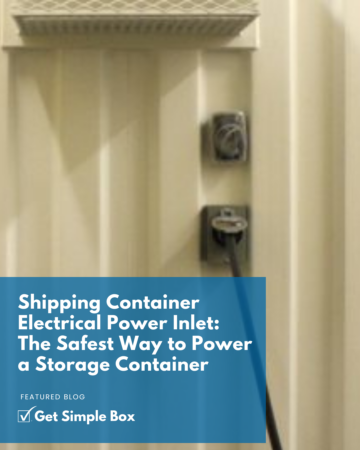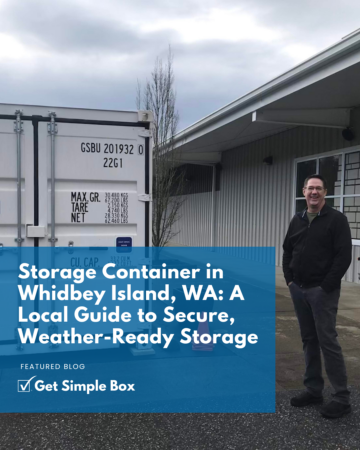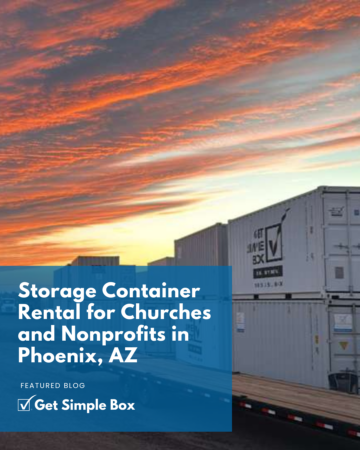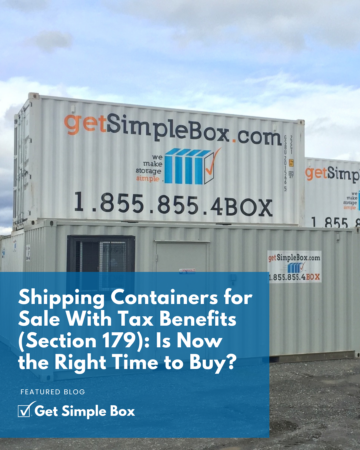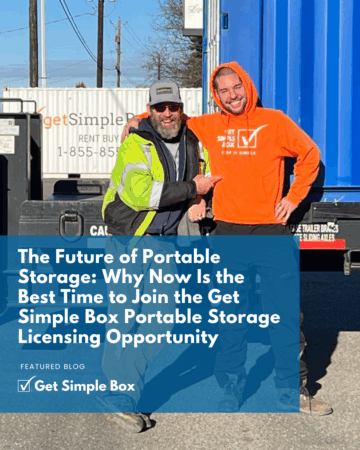Portable storage units have become increasingly popular in recent years as a convenient and cost-effective alternative to traditional self-storage options. Whether you’re moving, decluttering, or simply need extra space, portable storage units offer a flexible solution that can be delivered right to your doorstep. However, before you rent a unit, it’s important to consider the various costs involved so you can make an informed decision.
Table of Contents
Monthly rental fees
The monthly rental fee is the main cost associated with portable storage units. This fee will vary depending on the size of the unit, the company you rent from, and your location. Keep in mind that rental fees may increase if you keep the unit for an extended period of time, so be sure to ask about any potential rate hikes. It’s important to compare prices from different companies to ensure you’re getting the best deal on your monthly rental fee. Get Simple Box offers a range of sizes in portable storage containers.10 Foot Shipping Container Rentals
The exact measurements of these containers are 8 feet wide and 10 feet long. This size container is a great option for anyone who needs to fit a lot into a small space. While 10-foot container prices can vary widely and depend on availability, these smaller containers can sometimes be more expensive than larger alternatives. That is because this is not a standard size for overseas freight, so they are more difficult to come by.
20 Foot Shipping Container Rentals
We refer to this one as the ‘classic.’ This is the most commonly used container for renting and buying and is the most commonly used to transport goods all over the world. Due to the amount that is created and circulated on a global scale, these containers are often the best bang for your buck. They are the same weight as 20 foot containers at 8 feet but they have double the storage capacity.
40 Foot Shipping Container Rentals
If a 10 or 20 foot container isn’t going to do the job and you’re in need of additional space, a 40 foot container may be a viable option. While they offer twice the storage as their 20 foot predecessors, they are usually not going to cost you twice as much. In fact, they often are the best value per cubic foot of storage space.
Need additional options for your storage solutions? Live in Washington State, Oregon, or Arizona? Get Simple Box has an array of shipping container rental options to suit your needs, including standard 10 foot, 20 foot, 40 foot containers. We even offer a 20 foot basic office container rental that has a window, shelf brackets, and outlets so you can set up your office wherever your work takes you. Visit our container rental page to learn more.
Delivery and pickup fees
When you rent a portable storage unit, the company will typically deliver the unit to your location and pick it up when you’re finished with it. Delivery and pickup fees can vary greatly depending on the company and your location, so be sure to ask about these costs upfront. In some cases, delivery fees may be waived if you rent the unit for a certain length of time. It’s important to factor in these fees into your overall budget for portable storage as they can add up quickly.Insurance
Most portable storage companies offer insurance coverage, but it’s important to know what is and isn’t covered. For example, some policies may not cover the contents of the unit if it’s damaged during transport. Before you rent a unit, be sure to understand the insurance options and what they cover. This will give you peace of mind knowing your belongings are protected.
Late Fees
Just like with traditional self-storage, you may be charged a late fee if you don’t pay your monthly rental fee on time. Late fees can vary greatly depending on the company, so be sure to ask about them before you rent. Late fees can add up, so it’s important to stay on top of your monthly payments to avoid any additional costs.Taxes
Depending on your location, you may be required to pay sales tax on your monthly rental fee. Be sure to ask about taxes upfront so you’re not caught off guard when it comes time to pay. It’s important to factor in taxes into your overall budget for portable storage.In conclusion, when considering the cost of a portable storage unit, it’s important to keep in mind not just the monthly rental fee but also the various other costs involved, such as delivery and pickup fees, insurance, late fees, taxes, and any additional fees. By taking these costs into account, you can make an informed decision and ensure that you get the most bang for your buck when it comes to portable storage.
Share:
Related Posts
Shipping Container Electrical Power Inlet: The Safest Way to Power a Storage Container A shipping container is already one of
Storage Container in Whidbey Island, WA: A Local Guide to Secure, Weather-Ready Storage A storage container in Whidbey Island, WA
Storage Container Rental for Churches and Nonprofits in Phoenix, AZ A storage container rental for churches and nonprofits in Phoenix,
Shipping Containers for Sale With Tax Benefits (Section 179): Is Now the Right Time to Buy Before the End of
Supporting Our Whatcom, Skagit & Snohomish County Neighbors During This Week’s Flooding Western Washington is once again being hit by
The Future of Portable Storage: Why Now Is the Best Time to Join the Get Simple Box Portable Storage Licensing
